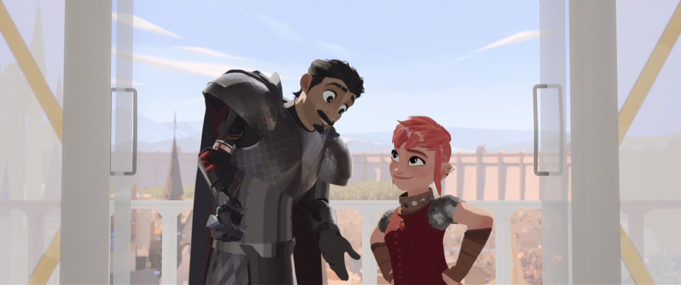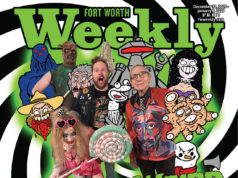There was a mild foofaraw last fall when Pixar included an openly gay teen couple in Strange World, but that movie is hopelessly tame next to another animated film, one that dropped on Netflix a couple of weeks ago. Does this make Nimona good? Not exactly — there are myriad storytelling issues at play here. Yet it’s truly unlike anything else that’s out there, which is why I’m mentioning it here.
Based on a graphic novel by ND Stevenson, the movie takes place in a feudal monarchy that also has smartphones and flying cars. Here, Ballister Boldheart (voiced by Riz Ahmed) is set to be the first-ever commoner in a millennium to become a knight. Not everybody likes this, but he has allies in the queen (voiced by Lorraine Toussaint) and Ambrosius Goldenloin (voiced by Eugene Lee Yang), his ridiculously named boyfriend who is knighted with him.
Yet Ballister’s moment of triumph literally blows up in his face as his sword explodes moments after he’s knighted and kills the queen before Ambrosius cuts off his arm. With his boyfriend now leading the manhunt for him, Ballister is approached by Nimona (voiced by Chloë Grace Moretz), a teenage girl who can shapeshift into any animal or human form she wants. The fugitive amputee knight has never heard of anyone who can do this and thinks she’s a monster, but he can use someone who can turn into a mouse and sneak into heavily guarded places or become a gorilla and swat enemies away.
We’ve seen people like Nimona in fantasy entertainment before, but it hits differently when you know about her creator. Stevenson was born Noelle Diana Stevenson but has had top surgery and identifies as transmasculine and bigender. (He also uses any gender pronouns. Since most sources seem to be using the male ones, I’m going with those.) He started working on Nimona while still an art student and turned the comic into his thesis project, publishing it on Tumblr before it hit print. It’s hard not to see the author’s trans-ness coming through when Nimona changes into a little kid to entrap someone in the assassination plot. Ballister notes that she’s now a boy, and she says craftily, “I am today.”
The film brings numerous changes to the comic: The relationship between Ballister and Ambrosius (who’s much more sympathetic here than in the book) becomes a full-blown romance instead of being implied. The backstory of Ballister (whose name is Blackheart rather than Boldheart in the book) is fleshed out considerably, too. There’s also a squire (voiced by Julio Torres) who possesses information about the assassination plot and who doubles this movie’s gay quotient all on his own. The animation gives the film a unique look, especially when Nimona relates how she got her powers while traveling in the subway, and the flashback plays out in the mosaic tiles in the train station. These changes are good and maybe even necessary for the adaptation.
It’s the little things that trip up this movie. The tin-eared contemporary script (with the knights addressing each other as “dude” and “bro”) jars with the medieval/futuristic look of the society around it. Co-directors Nick Bruno and Troy Quane have problems managing the tone, too, as when someone appears to stab Ambrosius and the scene is played too much for laughs. The ending is rushed, too, as the filmmakers aim for a big emotional impact and miss.
What saves this is the extensive working out of the title character. Nimona is a ball of anarchy who has internalized society’s hate (including, as a different flashback reveals, from the girl she once loved) and expresses that by breaking stuff. Moretz brings terrific energy to the part, but the movie works because the filmmakers keep their eye on where the destructiveness comes from. When Ballister asks Nimona why she doesn’t pick one body and stay with it, she describes the feeling of not shifting as “like the second before you sneeze.”
For the moment at least, it seems like fantasy films and TV are doing better than anything else to help cisgender society come to grips with trans people. Look at the way The Umbrella Academy accommodated Elliot Page’s gender transition and just kicked on with the story. Across the Spider-Verse possibly has a trans lead character, too, though it would really be radical if Gwen is trans and Miles falls in love with her. Nimona deserves its place alongside these entertainments at a time when trans people can certainly use them.
Nimona
Voices by Chloë Grace Moretz and Riz Ahmed. Directed by Nick Bruno and Troy Quane. Written by Robert L. Baird, Lloyd Taylor, and Pamela Ribon, based on ND Stevenson’s graphic novel. Rated PG.












